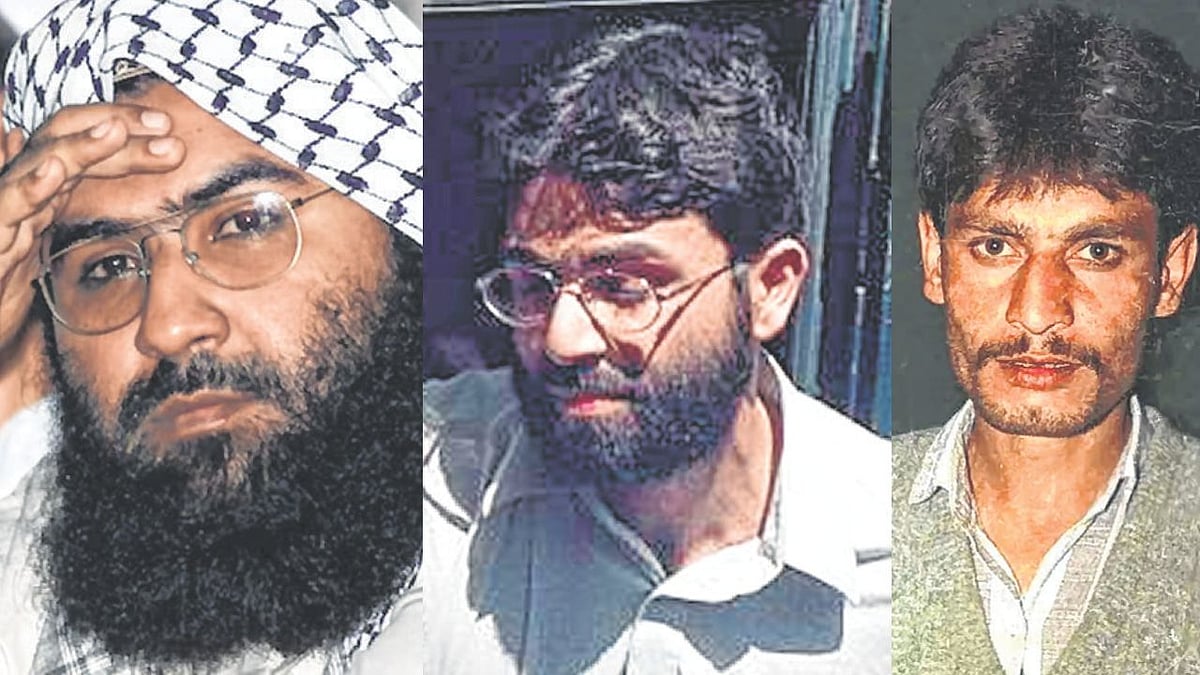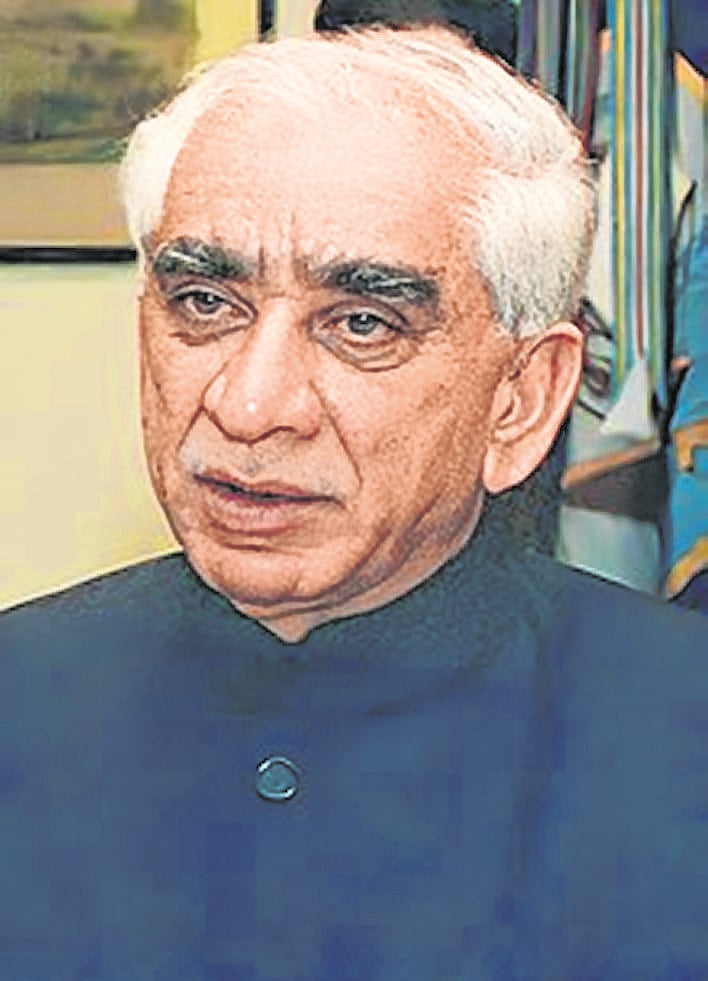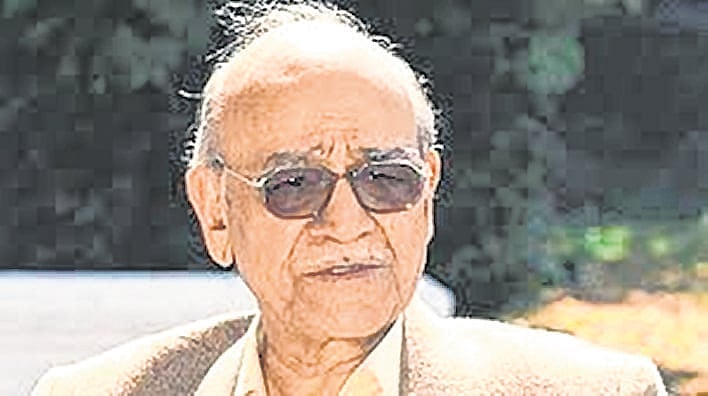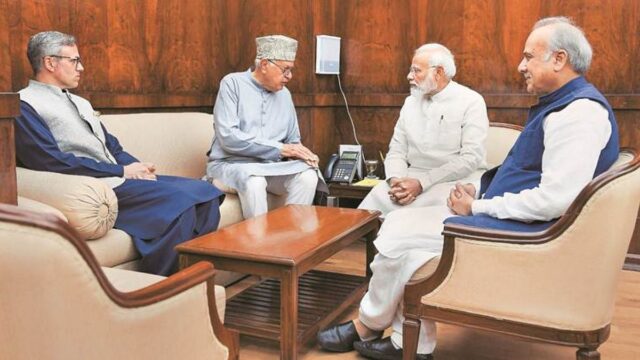Former Chief Minister Dr Farooq Abdullah was secretly on board when Article 370 was removed | X @ParrayMuneeb
A S Dulat’s revelation in his book The Chief Minister and The Spy, claiming that National Conference (NC) president Farooq Abdullah “privately backed” the Article 370 abrogation in 2019 has stirred the hornet’s nest.
The claim itself – that former J&K CM and National Conference President Dr Farooq Abdullah had ‘secretly’ supported the abrogation of Article 370 – is sure to dent the Sheikh legacy in J&K. Kashmiris have considered the abrogation of Article 370 as an assault on their identity and continuously demand the restoration of the special status of the state besides restoration of statehood.
According to the excerpts from the book, Dulat was informally tasked by the Modi-led central government to establish contact with Abdullah while the veteran Kashmiri leader was under house arrest in 2019. “Shortly after Article 370 was scrapped, someone from the Government of India requested me to reach out to Farooq,” Dulat writes.
He further revealed in his book that Abdullah’s release was tied to two unspoken conditions: refraining from criticizing the revocation of J&K’s special status and avoiding any reference to Pakistan.
According to Dulat, “I don’t recall if I spelled it out clearly, but Farooq was wise enough to grasp the message.”
Political Backlash: ‘Not Surprised’, Says Lone
Several opposition leaders took to the micro-blogging site, X and reacted to the revelation. Peoples Conference (PC) President and MLA Handwara, Sajad Gani Lone in a post said that he was not surprised at the revelation. “Dulat Sahib has revealed in his upcoming book that Farooq Sahib privately supported the abrogation of Article 370. Coming from Dulat sahib makes this revelation very credible. Dulat sahib is the closest ally of and friend of Farooq sahib. Virtually his alter ego. Incidentally Dulat Sahib is the famed Uncle of the infamous Uncles and Aunties Brigade of Delhi,” Lone wrote on X.
“Out here, their (National Conference) MLAs will privately visit LOP Sunil Sharma and tell him that they are brothers separated at the Kumbh Mela. That the theatre they enact in Assembly and outside assembly is in national interest. I personally am not surprised at this revelation. The August 4 2019 meeting of CM sahib and Farooq sahib with the PM was never a mystery for me. I can visualise Farooq sahib saying — Humey roney deejiye— Aap apna kaam karein— hum aap kay Saath hain— It now seems 2024 was a prize for services rendered in 2019. Of course in national interest,” he wrote.
Peoples Democratic Party (PDP) leader, Iltija Mufti said “Dulat sahab an ardent Abdullah supporter has shared how Farooq sahab agreed with Delhi’s illegal move of abrogating Article 370. There were already doubts about what transpired between the Abdullahs & PM days before J&Ks special status was revoked. With this it’s clear that Farooq sahab chose to stay in Kashmir instead of the Parliament to help normalise gutting of J&Ks constitution & subsequent betrayal,” she wrote on X.
Farooq Abdullah Fires Back, Calls It ‘Cheap Stunt to Sell Books’
Former Jammu and Kashmir chief minister Farooq Abdullah dismissed ex-R&AW chief A S Dulat’s claims that he had “privately backed” the Article 370 abrogation as a “cheap stunt” to boost the sales of the top spy’s forthcoming memoir.
He suggested that Dulat’s motive behind penning the book, slated for release on April 18, could be an attempt to reach the power corridors or earn a lot of money. “It is possible that he wants to make a new relationship,” Abdullah said.
Reacting angrily to Dulat’s assertion that the National Conference (NC) would have “helped” pass the proposal to abrogate the special status of the erstwhile state had it been taken into confidence, the 87-year-old president of the party said this was a “figment of imagination” of the author.
Abdullah pointed out that both he and his son Omar Abdullah had been put under arrest for several months at the time of the abrogation of Article 370 on August 5, 2019. “We were detained because our stand against the abrogation of special status was well-known,” he told PTI.
National Conference spokesperson Tanvir Sadiq denied that Farooq supported the 370 abrogation, terming the revelations in the book as “mere figment of imagination”.
“If you look at the book and what he writes in it, he contradicts his own words. He writes that the government of India waited for seven months to gauge the sense of Farooq Abdullah when he was in custody. But he set up the PAGD after coming out of jail to challenge the move,” said Sadiq.
Sadiq said Dulat’s previous book targeted Peoples Democratic Party patron and former chief minister Mufti Mohammad Sayed. “The author wants to stay relevant, and the book is nothing but a mere figment of imagination,” he added.
The NC chief said he had taken the initiative of bringing together all major political forces in Jammu and Kashmir and formed the People’s Alliance for Gupkar Declaration (PAGD), a coalition of political parties to defend the special status of the state.
Abdullah ridiculed Dulat’s claim that the NC would have got a resolution passed in the Jammu and Kashmir Assembly for the abrogation of Article 370.
With Inputs From PTI
How India exchanged terrorists for hostages inside flight IC-814
Here Is The Excerpts From The Book | The Chief Minister and the Spy
An Unlikely Friendship, former R&AW chief AS Dulat tells how he persuaded then J&K CM Farooq Abdullah to release Masood Azhar, Omar Sheikh and Mustaq Ahmed Zargar
Once Ajit Doval – then an excellent negotiator and IB man – and the other negotiators had whittled the hijackers’ demands down to three terrorists, Masood Azhar, Omar Sheikh and Mushtaq Zargar, the Indian government had to take a call. I was not in the IB in 1999, having joined as chief of the R&AW. But I remember it being a time of intense pressure. The media added to the cauldron-like atmosphere, flashing visuals of protesting families and crying relatives outside 7 Race Course Road (Lok Kalyan Marg).

The Three Terrorists mentioned in the book from (left to right) Masood Azhar, Omar Sheikh and Mushtaq Zargar | File Image
India’s hands were tied. Once the plane took off from Amritsar, we lost any advantage we might previously have possessed. Reluctantly, the green light was given to release the three terrorists – until it was suddenly realized that this could hardly happen without Farooq’s agreement. It was a measure of how much Delhi has relied on the unlikely friendship between the chief minister and the spy that I was picked to do the dirty work in this case.
Brajesh Mishra asked me to go to Jammu without wasting any time. The foreign minister, Jaswant Singh, called Farooq and formally let him know that the R&AW chief was being sent to him. When I rang him, Farooq seemed to shrug over the telephone, ‘You might as well come and stay with me.’

Jaswant Singh | File Image
It wasn’t a promising start, but then I hadn’t expected anything about this to be pleasant. As the R&AW aircraft landed in Jammu, the sun was setting on 30 December 1999. It was the month of Ramzan. I went straight to Farooq’s residence, where I found him sitting at his dining table by himself.
‘I know why you’ve come,’ he said curtly. ‘Just let me go and say my prayers.’
I sat and waited for him.
After his prayers he came out and had his juice.
Then it began.
Wheeling on me, he said angrily, ‘You again? Tumne Mufti ki beti ke liye kiya tha, phir wohi kar rahe ho.’ (You again? You did this once before, for Mufti’s daughter – and now you’re back again.)
He wasn’t wrong. During both Rubaiya’s kidnapping and this case, he was the chief minister of Jammu and Kashmir, and in both cases, I was the one representing Delhi – and asking him to do things that he did not want to do. Most The Chief Minister and the Spy 240 people would be wary of raising their voice with the R&AW chief, but Farooq, as I’ve told you, never gave a damn about who he was talking to. For three hours, I sat there quietly as he shouted at me. I knew, instinctively, that he was not shouting at me – but at Delhi, via me. Farooq was always one for theatre, and if this was a chance to give some shit back to Delhi, he wouldn’t miss it for the world.
‘You were there during Rubaiya’s kidnapping,’ he snapped. ‘How could you come back again?’
‘Sir, I was solidly with you that time, but this time I’m with the Government of India,’ I said soothingly. ‘At that time, I was pleading along with you. This time, I’m pleading with you.’
This only served to infuriate him further. ‘I said then that whatever you are doing is wrong, and I’m saying it again,’ he shouted. ‘I don’t agree with it.’
When I look back at it, it was as though Farooq was experiencing waves of anger. He would calm down and then he would start all over again. The theme never varied: how weak Delhi was; what a big mistake this was; they were all buffoons. In any other circumstance, it would have been frankly awe-inspiring, because Farooq’s rage never flagged, nor did his eloquence.
When I could get a word in edgewise, I seized the chance, ‘Sir, there is no other option; this has to be done.’
Farooq didn’t seem to be listening.
He flung around to his telephone and rang up Jaswant Singh, ‘Aap jo bhi kar rahe hain, galat kar rahe hain.’ (Whatever you’re doing, you’re doing the wrong thing.) He stormed and banged the phone down.
He called others up in Delhi. He kept banging the phone down.
Then, tiring a little, he finally sat down and looked at me. ‘Those two bloody Pakistanis or whatever they are, I don’t give a damn. Let them go to hell.’ He was referring to Masood Azhar and Omar Sheikh. ‘But I will not let this Kashmiri fellow [Zargar] go, he’s a killer. He will not be released.’
That could not be.
‘Sir,’ I said remonstratively. ‘This will not happen without Zargar.’
‘I don’t care if it happens or not!’ Farooq raged. Then he pulled out his own trump card, ‘Fine, I’m going to the governor and giving him my resignation.’
But here, he had reckoned without my knowledge of his personality. I had known that, at some point in this conversation, he would say this.
‘Sir, if you’re going to the governor, then at least take me along.’
At ten o’clock that night, we went to see Governor Girish Chandra ‘Gary’ Saxena. Gary was a former R&AW chief himself, so I wasn’t worried. He knew how to handle Farooq and a touchy situation.

Former R&AW chief
Girish Chandra ‘Gary’ Saxena | File Image
The chief minister entered and spoke without preamble, ‘These fellows want these terrorists released and I’ve told the R&AW chief I won’t be a party to it,’ Farooq told him. ‘I would rather resign, and that’s what I have come to do.’
‘Doctor Sahib, come, sit down, relax,’ Gary said soothingly. ‘You’re a fighter, you don’t give in so easily.’
Out came a bottle of Black Label whisky.
Excerpted with permission from Juggernaut (pages 238-242)

















































